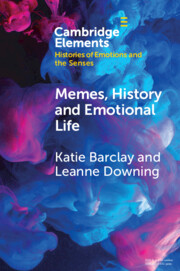30 results
18 - Sexuality and Emotion
-
-
- Book:
- The Cambridge World History of Sexualities
- Published online:
- 26 April 2024
- Print publication:
- 16 May 2024, pp 388-409
-
- Chapter
- Export citation

Memes, History and Emotional Life
-
- Published online:
- 16 June 2023
- Print publication:
- 13 July 2023
-
- Element
- Export citation
Carolyn Steedman. History and the Law: A Love Story. Cambridge: Cambridge University Press, 2020. Pp. 294. $99.99 (cloth).
-
- Journal:
- Journal of British Studies / Volume 62 / Issue 2 / April 2023
- Published online by Cambridge University Press:
- 05 June 2023, pp. 545-546
- Print publication:
- April 2023
-
- Article
- Export citation

Academic Emotions
- Feeling the Institution
-
- Published online:
- 17 November 2021
- Print publication:
- 16 December 2021
-
- Element
- Export citation
The Sound of Politics in Early Nineteenth-Century Ireland
-
- Journal:
- Journal of British Studies / Volume 60 / Issue 2 / April 2021
- Published online by Cambridge University Press:
- 09 April 2021, pp. 389-402
- Print publication:
- April 2021
-
- Article
- Export citation
5 - Independence, Affection and Mobility in Eighteenth-Century Scotland
-
-
- Book:
- Keeping Family in an Age of Long Distance Trade, Imperial Expansion, and Exile, 1550–1850
- Published by:
- Amsterdam University Press
- Published online:
- 21 November 2020
- Print publication:
- 26 October 2020, pp 127-146
-
- Chapter
- Export citation
Mary C. Flannery. Practising Shame: Female Honour in Later Medieval England. Manchester Medieval Literature and Culture 29. Manchester: Manchester University Press, 2020. Pp. 228. $120.00 (cloth).
-
- Journal:
- Journal of British Studies / Volume 59 / Issue 4 / October 2020
- Published online by Cambridge University Press:
- 07 October 2020, pp. 896-897
- Print publication:
- October 2020
-
- Article
- Export citation
LOVE, CARE AND THE ILLEGITIMATE CHILD IN EIGHTEENTH-CENTURY SCOTLAND
-
- Journal:
- Transactions of the Royal Historical Society / Volume 29 / December 2019
- Published online by Cambridge University Press:
- 01 November 2019, pp. 105-125
- Print publication:
- December 2019
-
- Article
- Export citation
Suffering and happiness in England, 1550–1850. Narratives and representations. A collection to honour Paul Slack. Edited by Michael J. Braddick and Joanna Innes. (The Past and Present Book Series.) Pp. xii + 260 incl. frontispiece, 13 figs and 2 tables. Oxford–New York: Oxford University Press, 2017. £65. 978 0 19 8744826
-
- Journal:
- The Journal of Ecclesiastical History / Volume 70 / Issue 4 / October 2019
- Published online by Cambridge University Press:
- 20 September 2019, p. 884
- Print publication:
- October 2019
-
- Article
- Export citation
7 - Negotiating Independence: Manliness and Begging Letters in Late Eighteenth- and Early Nineteenth-Century Scotland
- from Part II - Representations
-
-
- Book:
- Nine Centuries of Man
- Published by:
- Edinburgh University Press
- Published online:
- 27 April 2017
- Print publication:
- 27 April 2017, pp 142-159
-
- Chapter
- Export citation
Special Issue: Caring for Children Outside the Home – From Institutions to Nations
-
- Journal:
- Children Australia / Volume 41 / Issue 3 / September 2016
- Published online by Cambridge University Press:
- 17 August 2016, pp. 165-167
- Print publication:
- September 2016
-
- Article
-
- You have access
- HTML
- Export citation
Providing Care for Children: How Service Providers Define and Apply “Care” in Contemporary South Australia
-
- Journal:
- Children Australia / Volume 41 / Issue 3 / September 2016
- Published online by Cambridge University Press:
- 26 July 2016, pp. 178-189
- Print publication:
- September 2016
-
- Article
- Export citation
Part III - Constructing the Next Generation
-
- Book:
- Children and Youth in Premodern Scotland
- Published by:
- Boydell & Brewer
- Published online:
- 11 May 2021
- Print publication:
- 15 October 2015, pp 153-154
-
- Chapter
- Export citation
Abbreviations and Conventions
-
- Book:
- Children and Youth in Premodern Scotland
- Published by:
- Boydell & Brewer
- Published online:
- 11 May 2021
- Print publication:
- 15 October 2015, pp xvi-xvi
-
- Chapter
- Export citation
Frontmatter
-
- Book:
- Children and Youth in Premodern Scotland
- Published by:
- Boydell & Brewer
- Published online:
- 11 May 2021
- Print publication:
- 15 October 2015, pp i-iv
-
- Chapter
- Export citation
8 - Natural Affection, Children, and Family Inheritance Practices in the Long Eighteenth Century
-
-
- Book:
- Children and Youth in Premodern Scotland
- Published by:
- Boydell & Brewer
- Published online:
- 11 May 2021
- Print publication:
- 15 October 2015, pp 136-152
-
- Chapter
- Export citation
Contents
-
- Book:
- Children and Youth in Premodern Scotland
- Published by:
- Boydell & Brewer
- Published online:
- 11 May 2021
- Print publication:
- 15 October 2015, pp vii-viii
-
- Chapter
- Export citation
List of Illustrations
-
- Book:
- Children and Youth in Premodern Scotland
- Published by:
- Boydell & Brewer
- Published online:
- 11 May 2021
- Print publication:
- 15 October 2015, pp ix-x
-
- Chapter
- Export citation
Part II - Representations of the Young
-
- Book:
- Children and Youth in Premodern Scotland
- Published by:
- Boydell & Brewer
- Published online:
- 11 May 2021
- Print publication:
- 15 October 2015, pp 87-88
-
- Chapter
- Export citation
Dedication
-
- Book:
- Children and Youth in Premodern Scotland
- Published by:
- Boydell & Brewer
- Published online:
- 11 May 2021
- Print publication:
- 15 October 2015, pp v-vi
-
- Chapter
- Export citation

